An Effective Organizational Development Plan for Food and Beverage Manufacturing

An effective organizational development (OD) plan for a food and beverage manufacturing company can zero in on several key areas to improve efficiency, productivity, and overall company performance. A wide-ranging outline for such a plan could be as follows:
- Assessment / Analysis
- Needs Analysis: Conduct surveys, interviews, and focus groups with employees at all levels to understand current challenges and areas for improvement.
- SWOT Analysis: Evaluate the company’s strengths, weaknesses, opportunities, and threats to identify strategic areas for development.
- Strategic Planning
- Vision and Mission Alignment: Ensure that the company’s vision, mission, and values are clear and align with the strategic goals.
- Goal Setting: Define short-term and long-term goals for the Organizational Development plan with measurable outcomes.
- Leadership Development
- Training Plans: Develop and implement leadership training for managers and supervisors to enhance their skills in people management, conflict resolution, and decision-making.
- Coaching and Mentoring: Establish a mentoring plan where experienced leaders coach junior employees.
- Employee Development
- Skills Training: Provide training plans focused on technical skills relevant to food and beverage manufacturing, such as quality control, food safety, and production techniques.
- Career Pathways: Develop clear career pathways and progression plans to motivate and retain employees.
- Process Improvement
- Lean Manufacturing: Implement lean manufacturing principles to streamline processes, reduce waste, and improve efficiency.
- Six Sigma: Use Six Sigma methodologies to improve process quality and reduce variability in production.
- Change Management
- Communication Plans: Develop robust communication strategies to keep employees informed and engaged during changes.
- Change Champions: Identify and train change champions within the organization to facilitate and support change initiatives.
- Culture and Engagement
- Employee Engagement Surveys: Regularly measure employee engagement and use the feedback to make necessary adjustments.
- Team Building Activities: Organize team-building activities to foster collaboration and a positive work environment.
- Performance Management
- KPIs and Metrics: Establish key performance indicators (KPIs) and metrics to track the progress of the OD initiatives.
- Regular Reviews: Conduct regular performance reviews and provide constructive feedback to employees.
- Health and Safety
- Safety Training: Provide comprehensive safety training to all employees to ensure a safe working environment.
- Health Initiatives: Promote health and wellness plans to support the well-being of employees.
- Technology and Innovation
- Technology Upgrades: Invest in new technologies and equipment that can improve manufacturing processes and product quality.
- Innovation Plans: Encourage innovation by creating platforms for employees to suggest and develop new ideas.
- Sustainability
- Environmental Practices: Implement sustainable practices to reduce the environmental impact of manufacturing operations.
- Sustainable Sourcing: Ensure that raw materials are sourced sustainably and ethically.
- Evaluation and Continuous Improvement
- Feedback Mechanisms: Set up mechanisms to continuously collect feedback from employees and stakeholders.
- Continuous Improvement: Regularly review and refine the OD plan based on feedback and changing needs.
Implementation Plan
- Phase 1: Planning and Communication
- Develop a detailed project plan.
- Communicate the OD plan to all employees.
- Phase 2: Pilot Plans
- Implement pilot plans in select departments or teams.
- Gather data and make adjustments as needed.
- Phase 3: Full-Scale Implementation
- Roll out the OD initiatives company wide.
- Provide ongoing support and resources.
- Phase 4: Evaluation and Scaling
- Evaluate the success of the plan.
- Scale successful initiatives and make continuous improvements.
Key Considerations
- Stakeholder Involvement: Ensure that all key stakeholders are involved in the planning and implementation process.
- Resource Allocation: Allocate necessary resources (time, budget, personnel) to support the OD plan.
- Flexibility: Be flexible and adaptable to changes and new information as the plan progresses.
A comprehensive OD plan aims to create a more efficient, productive, and engaged workforce in the food and beverage manufacturing sector, ultimately leading to improved business performance allowing scalability, increased revenue.
At MLC Management Consulting, we offer a range of services tailored to enhance your organization’s efficiency and effectiveness. Our expertly designed strategies ensure that your leaders and teams are equipped not only to meet but exceed the demands of their roles, providing your business with a substantial competitive advantage in team development. Explore how our solutions can benefit you today and propel your team toward unprecedented success.
